The voice of Rabbi Yehuda (Yudi) Dukes is familiar to thousands. A talented Torah reader who knows the entire Torah by heart, he has read the Torah in synagogues from Budapest to Buenos Aires. Gifted with a knack for languages, he regularly regaled people by speaking to them in their native tongues. And as director of JNet, a Chabad program that connects people for weekly sessions of over-the-phone Torah-study sessions, he has guided thousands of individuals in charting personal Torah-study courses.
But he hasn’t uttered a word since before Passover.
Struck by coronavirus while sheltering in place with his family in Long Island, N.Y., the otherwise healthy 38-year-old father of six was taken to New York University Hospital in Manhattan, where his situation continued to deteriorate to the point that he was sedated, intubated and placed on a ventilator. As his lungs collapsed one after another, he was placed on ECMO, which artificially oxygenates the blood. While most people on ECMO are off within a week, the rabbi has been on ECMO for eight long weeks.
While he was holed up in the hospital without visits from family or friends, his wife was quarantined at home with their six children, the eldest of whom recently celebrated his bar mitzvah.
“I have nothing else to do but turn to G‑d and ask Him to give me more strength,” his wife, Sarah Dukes, posted to social media. “I know he’s going to be OK in the end, and the nurses have been so reassuring, but I miss him so much. Hearing my 2-year-old son ask his father why he’s not talking back to him over the phone and that he wants him to sing to him completely broke me inside.”
Yet she has remained a pillar of faith in her posts, each of which garners hundreds and even thousands of comments and reactions.
In those first weeks, she was tasked with the daunting task of preparing her home and her children, physically and emotionally, for what would be a Passover like no other.
At the same time, she was at the epicenter of the multifaceted efforts undertaken to help provide her husband with the best path towards healing, working on the medical and spiritual fronts simultaneously.
Groundswell of Good Deeds

As news spread across the globe via social media, a groundswell of good deeds and resolutions poured in. Individuals—some of whom know the rabbi and his work, and others who don’t—were inspired to make changes in their lives, in prayerful hopes that changes would come to his situation.
Yehuda Dukes has directed JNet since 2006. Personable and solicitous to a fault, he was the right man for the job, remembering everyone’s name, the name of their study partner and their study preferences off the top of his head.
As their family grew, Sarah Dukes, grew her own career as a mental-health counselor, and musician, whose compositions have been officially included on the Grammy ballot.
Their wide network of friends and fans, including the rabbi’s peers at Lubavitch World Headquarters, JNet members, fellow congregants at Chabad of the Five Towns and strangers, have assisted them with food, logistical help and medical advocacy.
At the same time, a cadre of nurses and medical staff have stepped up to convert his sterile hospital room into a homey presence, plastering the walls and windows with handmade posters, pictures, letters and other memorabilia.
They have also been helping the rabbi don tefillin every day even while unconscious—an activity he never missed since his bar mitzvah and one he relished doing with others whenever possible.
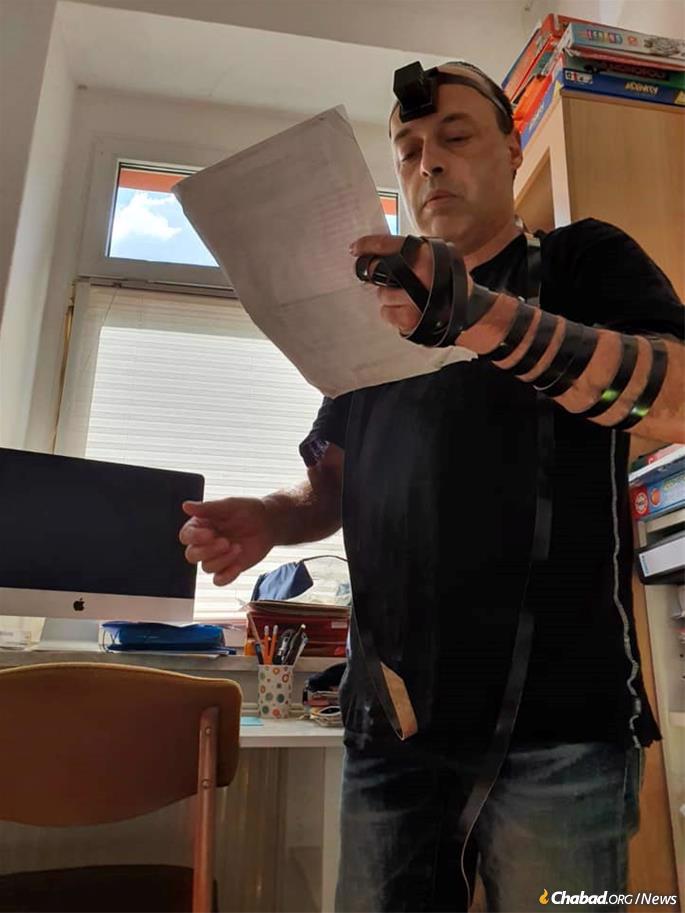
On a nearly daily basis, they have come into his room and set his phone to play voice notes from friends and family, Chassidic music and his wife’s award-winning compositions, as well as a stream of voices from his own home, so close but so far away.
At first glance, it would seem that the couple is currently on the receiving end of others’ largess.
Yet judging by the thousands of reactions to the photos, messages and muses Sarah Dukes has posted on Instagram and Facebook, it has become apparent that the thousands who have followed their journey find themselves gleaning strength and faith in watching how they each hold on to faith, each other and life as the world slowly transitioned from spring to summer.
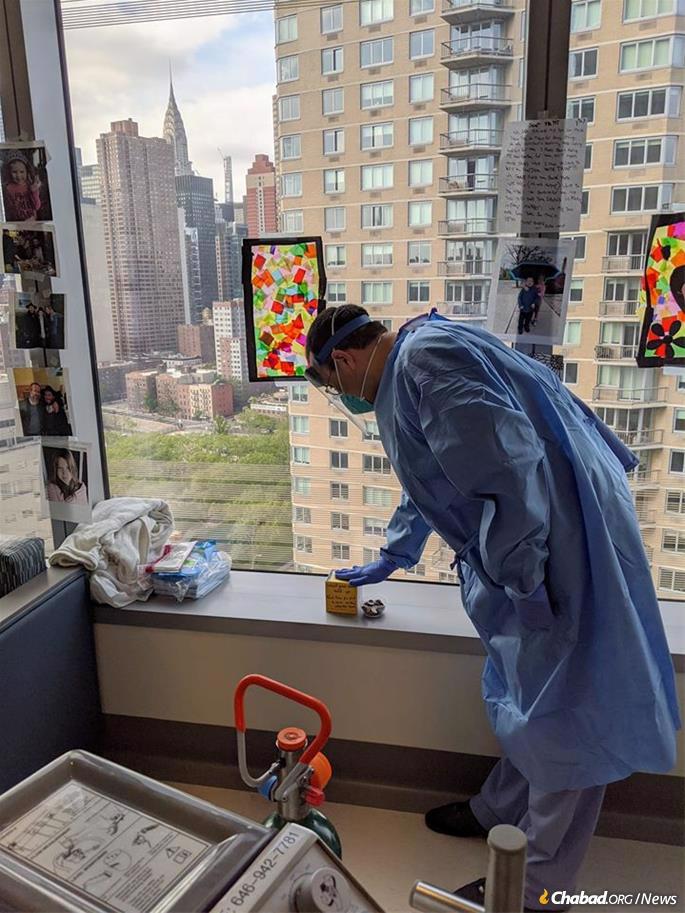
Thousands of people wrote to the couple, telling of the mitzvahs they have done via the form at: www.jnet.org/mitzvah4yudi. They will be aggregated and included in a book that will be presented to the rabbi when he awakes.
Sarah shared a message she received from someone who had offered the owner of a coffee plantation in Rwanda to put on tefillin. The man demurred, explaining that he had been putting them on daily in honor of a rabbi in New York, whose wife had put out a call for mitzvahs to be done in his honor.
In Chicago, high school girls have begun practicing Hebrew reading with kindergarteners, whose schooling has been curtailed due to it moving online. Appropriately, the program has been dubbed JNet Junior, and the learning is in merit of the rabbi.
Late last month, after a particularly discouraging barrage of medical updates, someone who had heard about their situation decided to gift the rabbi with a dollar he had received from the Rebbe. At Sarah’s request, the nurse planned to first put the dollar in her husband’s hand before placing it on display. But as soon as he wrapped his fingers around the dollar, he did not let go, and it remained clutched in his hand for days, clearly indicating that he was aware of the dollar and its significance.
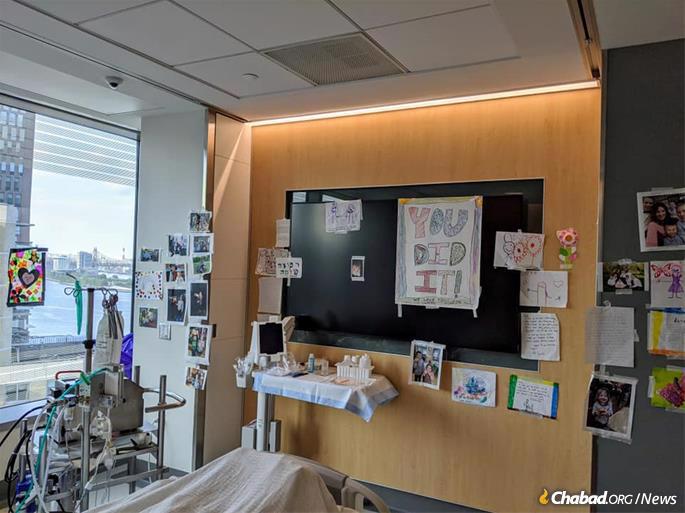
‘I Know That It Has a Purpose’
Soon thereafter, his numbers stabilized and took a turn for the better.
Concurrently, the go-ahead was granted for the doctors to administer a promising placenta-based therapy developed in Israel called Pluristem that has the potential to help tens of thousands of COVID-19 patients around the world.
When his wife came to the hospital to sign consent papers, she was also granted permission to visit her husband for the first time in nearly two months.
As people around the world “stormed the heavens” by reciting Psalms and other prayers, the stem-cell therapy was successfully administered, and the couple was able to finally see each other face to face.
As Sarah chronicles in her regular updates, the visits are a mixture of delight upon seeing her husband tracking her movements with his eyes, and responding to her words and those she plays over the phone, in addition to the disappointments at the medical setbacks that continue to dog his recovery.
Every year in June, Rabbi Dukes hosts an appreciation dinner for JNet volunteers and supporters. This year, the event is taking place online. A balance of inspiration and entertainment, the program’s highlight will be a presentation from the people who are learning each week.

“No one knows for sure why we were chosen for this unique test, but I know that it has a purpose,” she wrote. “To me, that purpose is for us to continue Yudi’s life mission and even ramp it up, doing more mitzvot, more acts of kindness, learning more Torah and making the world a better place. When Yudi is released from the hospital, this time won’t be lost or wasted. On the contrary, he will be able to look with pride at how much he has accomplished through each and every one of us.”
Update 7/1/20: Yehuda is on the slow and bumpy road to recovery, but with G‑d’s help, he is heading in the right direction. He has gained strength and is able to mouth words and even move around a bit. At the same time, he is facing ongoing challenges as he recovers from the ravages of COVID-19 and the after-effects of the heavy medications that kept him alive. Please increase in Torah study and mitzvah observance in honor of Chaim Schneur Zalman Yehuda ben Hinda Yocheved.

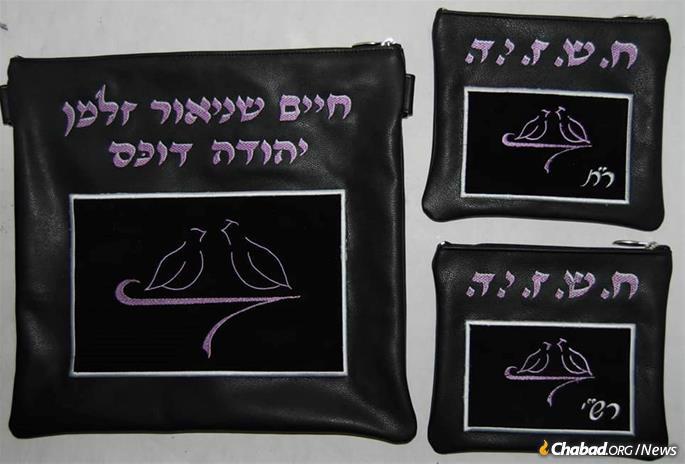

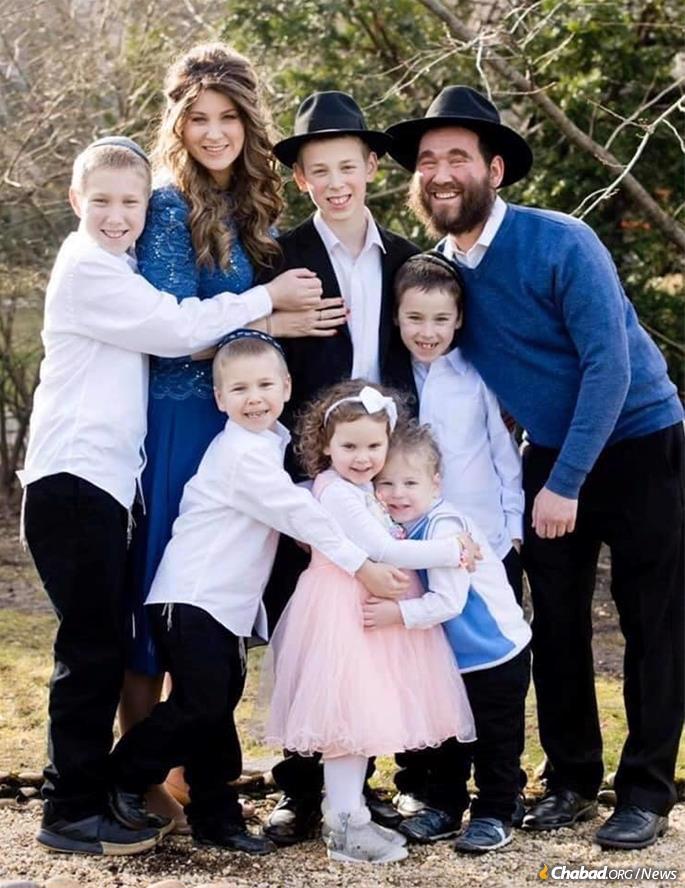







Join the Discussion